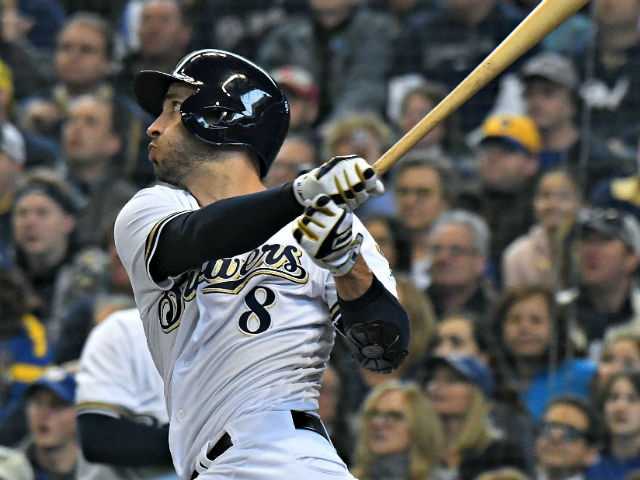With two outs in the bottom of the ninth inning Tuesday night at Miller Park, Ryan Braun hit a walk-off home run to beat the St. Louis Cardinals, 5-4, capping an impressive comeback with an exhilarating victory and earning himself a cold Gatorade bath that stained his white jersey pink.
It was an awesome ending to a fun game – Christian Yelich had homered one batter before to tie it up – and, with the crowd cheering deliriously, it immediately evoked other instances of Braun’s late-game heroics. The walk-off grand slam against the Pittsburgh Pirates in the final week of the 2008 playoff season; the 11th-inning walk-off homer to beat the Colorado Rockies in the final month of the 2011 playoff season; heck, even the walk-off run he scored coming home on a wild pitch against the Chicago Cubs last year was thrilling.
The Milwaukee Brewers’ longest-tenured player – and the highest-paid in franchise history – has had plenty of wonderfully memorable moments. And, as an even-keeled, California-cool former MVP – who once held an elaborate press conference to, staunchly but utterly untruthfully, deny PED allegations – Braun exudes poise under pressure, acquiring a reputation for coming through in the clutch. Just last Friday, with the Brewers down to their last strike, he launched a game-winning three-run homer against the San Diego Padres.
Anecdotally, we think of Ryan Braun as clutch, an eminently unflappable hitter who performs at his best – or, at least, relatively well – when the stakes are the highest. We hear euphoric Bob Uecker and Brian Anderson home run calls, see a mass of teammates mob him at the plate and, generally, just feel confident when No. 8 is in the batter’s box in a big spot.
But, over the course of his decorated 11-year career, is Braun actually more productive in crucial moments than he is otherwise, or does he just have a rousing flair for the highlight-reel dramatic?

Because Fangraphs is incredible and has statistics for everything, Fangraphs has a statistic for this: clutch performance, which is a measure of how much better or worse a player does in high-leverage situations than he would in a context-neutral environment. As the website puts it, "It’s founded upon win probability, and it essentially measures how much a player has actually helped, versus how much you would’ve expected that player to help. It’s a measure of timing, and although it isn’t perfect, nothing is."
Indeed, as baseball fans and social-media commenters on this article will note, the notion of "clutch" is among the most nebulous, volatile and artificially constructed conceptions in baseball. Even Fangraphs, the bible for baseball stats, admits it’s a fickle thing, and just being a Major League Baseball player implies a player can handle the brightest of spotlights already.
Fangraphs' leaderboard has more than four decades of win-expectancy data, stretching back to 1974. As it notes in a 2017 blog post, clutch performance is "basically random, as one would expect" since "we’re all conditioned to be clutch-baseball skeptics, and for good reason."
But with Fangraphs’ vast and comprehensive library of numbers, this is the best way we’ve got to analyze – and subsequently argue over – the so-called clutch gene. So let’s do it.
First, some context. All-time, Tony Gwynn has the highest clutch performance at 9.49, followed by Pete Rose at 9.07, meaning the two legends, as hitters, were about nine wins more valuable than you might’ve expected them to be, based on their career probabilities. Among qualified players, the most unclutch performer ever is – get this – Sammy Sosa at 14.67. (And, to answer your immediate follow-up question, Yankees fans, Alex Rodriguez has the seventh-worst clutch performance all-time at 9.53.)
But let’s focus on current players. Ichiro Suzuki has the best clutch performance at 8.23, which is nearly 2.5 wins higher than the next-closest player. Incidentally, the most unclutch active player is Matt Kemp (minus-8.12), the Los Angeles Dodgers outfielder often linked with Braun in trade rumors. A look at the top and bottom 20 reveals that great players occupy both ends of the spectrum.

Among the 220 active players who qualify by plate appearances, Braun ranks 181st in clutch performance, at minus-2.59 for his career, meaning he’s about 2.5 wins less-valuable in high-leverage situations than normal ones. (Don’t despair, Brewers fans: Angels superstar Mike Trout is two spots behind him at minus-2.60.) It’s not a good place to be, but it’s not as bad as it seems.
For some elite players, uncharacteristically negative clutch performance is just a random blip, an anomalous season over a standout career, while for others it suggests a legitimate decline from their typically strong win expectancy. But Braun has basically always been the same guy. His clutch performance has never been worse than minus-1.63 (his rookie year) or better than 0.83 (his second year), and it’s hovered right around zero, sometimes just a bit below, ever since.
Season to season, Braun is not really clutch and not quite unclutch, compared to his own expected performance. For someone with an excellent career win probability added of nearly 30, that slightly negative clutch performance is still productive, compared to an average player. But given how good a hitter Braun is in "context-neutral environments," he should be better in high-leverage situations.
Remember, clutch performance only compares players to themselves, which makes it more reliable and instructive than comparing them to different people with different baselines and projections in different situations. Considering Braun's talent level and overall career numbers, we can say he's been statistically less clutch than the data indicates he should be. That's somewhat of a surprise, based on what we remember and might guess, but it hardly shows a trend and certainly doesn't predict future results.
Braun's annual variation from expected output over the last decade has been very small, and clutch performance itself, as Fangraphs would admit, is a murky and hard-to-measure statistic. For the most part, hitters try as hard as they can to hit the ball as well as they can every time they're up, regardless of the situation, and clutchness has been contrived to find meaning in mostly random events.
It's a boring and unsatisfying conclusion, that Braun – composed, cliché-spoken and a consistently valuable offensive player his entire career – is no better and not much worse a performer in the clutch, and that the analysis itself doesn't really matter. But it's a conclusion Braun would probably appreciate, because he'd say it’s important to take the same approach and have a solid at-bat every time and it's a long season, etc.
Braun is still a more favorable performer to have up than an average MLB player in a clutch situation, but compared to his own win probability added, Braun's not as clutch as he should be. So Braun may not be clutch, but he's still pretty good in the clutch. Excuse me while I clean up the vomit from articulating this premise.
This all means you can continue to anticipate something relatively good will happen when he’s at the plate in the bottom of the ninth, because Braun is still a relatively good offensive player, even if homers and groundouts are not much more or less likely than they would be in the fourth inning. And mainly, it's another good reminder to keep watching until the final out because (like on Tuesday night), you never know what's gonna happen.
Braun's 2008 and 2011 September walk-offs were among the most important plays in franchise history, as they helped the Brewers make the playoffs. But Braun's also had countless groundouts or walks that brought up the next batter, who then ended the game. We remember the homers because they stand out, we forget the flyouts because they don't, and Braun hasn’t had enough high-profile opportunities to strike out in a playoff game on national TV to garner an A-Rodesque unclutch narrative. He's just a decent hitter, almost all the time, who's had some unforgettable moments.
Now, how do some of the other Brewers perform in the clutch? New center fielder – and World Series winner – Lorenzo Cain is the best, with a 2.37 career win probability added that ranks 20th among active Major Leaguers. Third baseman Travis Shaw is next at 1.34 (36th in the league), followed by second baseman Jonathan Villar – weird, right? – at 1.12 (41st) and second baseman Eric Sogard at 0.96 (47th). Yelich ranks 105th at minus-0.41, first baseman Eric Thames is 115th at minus-0.74, utility man Hernan Perez is 129th at minus-1.21 and right fielder Domingo Santana is 132nd at minus-1.32.
Finally, among qualified batters, is Braun at minus-2.59, last on the team, though except for Cain, all those other players have had far shorter and less-accomplished careers. And let's be honest: There are few Brewers you'd rather have up in a clutch spot, and still nothing that beats the excitement of a Brauny walk-off home run.
Born in Milwaukee but a product of Shorewood High School (go ‘Hounds!) and Northwestern University (go ‘Cats!), Jimmy never knew the schoolboy bliss of cheering for a winning football, basketball or baseball team. So he ditched being a fan in order to cover sports professionally - occasionally objectively, always passionately. He's lived in Chicago, New York and Dallas, but now resides again in his beloved Brew City and is an ardent attacker of the notorious Milwaukee Inferiority Complex.
After interning at print publications like Birds and Blooms (official motto: "America's #1 backyard birding and gardening magazine!"), Sports Illustrated (unofficial motto: "Subscribe and save up to 90% off the cover price!") and The Dallas Morning News (a newspaper!), Jimmy worked for web outlets like CBSSports.com, where he was a Packers beat reporter, and FOX Sports Wisconsin, where he managed digital content. He's a proponent and frequent user of em dashes, parenthetical asides, descriptive appositives and, really, anything that makes his sentences longer and more needlessly complex.
Jimmy appreciates references to late '90s Brewers and Bucks players and is the curator of the unofficial John Jaha Hall of Fame. He also enjoys running, biking and soccer, but isn't too annoying about them. He writes about sports - both mainstream and unconventional - and non-sports, including history, music, food, art and even golf (just kidding!), and welcomes reader suggestions for off-the-beaten-path story ideas.







